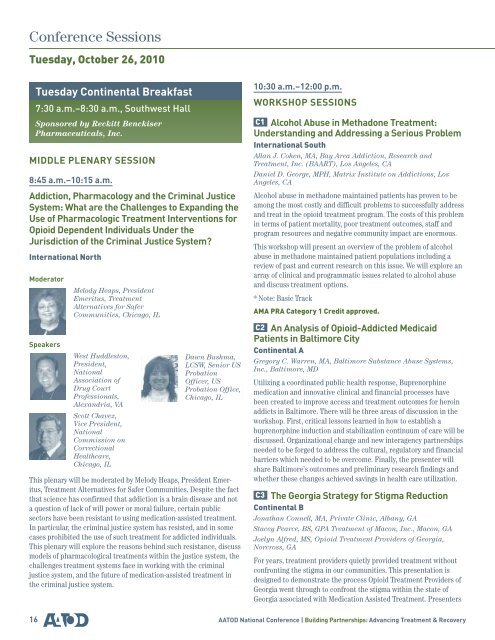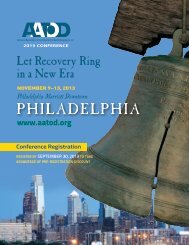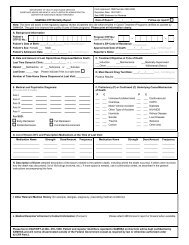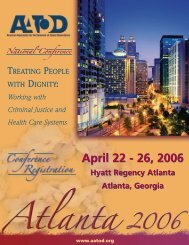Final Conference Program - aatod
Final Conference Program - aatod
Final Conference Program - aatod
You also want an ePaper? Increase the reach of your titles
YUMPU automatically turns print PDFs into web optimized ePapers that Google loves.
<strong>Conference</strong> Sessions<br />
Tuesday, October 26, 2010<br />
Tuesday Continental Breakfast<br />
7:30 a.m.–8:30 a.m., Southwest Hall<br />
Sponsored by Reckitt Benckiser<br />
Pharmaceuticals, Inc.<br />
MIDDLE PLENARY SESSION<br />
8:45 a.m.–10:15 a.m.<br />
Addiction, Pharmacology and the Criminal Justice<br />
System: What are the Challenges to Expanding the<br />
Use of Pharmacologic Treatment Interventions for<br />
Opioid Dependent Individuals Under the<br />
Jurisdiction of the Criminal Justice System<br />
International North<br />
Moderator<br />
Speakers<br />
Melody Heaps, President<br />
Emeritus, Treatment<br />
Alternatives for Safer<br />
Communities, Chicago, IL<br />
West Huddleston,<br />
President,<br />
National<br />
Association of<br />
Drug Court<br />
Professionals,<br />
Alexandria, VA<br />
Scott Chavez,<br />
Vice President,<br />
National<br />
Commission on<br />
Correctional<br />
Healthcare,<br />
Chicago, IL<br />
Dawn Bushma,<br />
LCSW, Senior US<br />
Probation<br />
Officer, US<br />
Probation Office,<br />
Chicago, IL<br />
This plenary will be moderated by Melody Heaps, President Emeritus,<br />
Treatment Alternatives for Safer Communities. Despite the fact<br />
that science has confirmed that addiction is a brain disease and not<br />
a question of lack of will power or moral failure, certain public<br />
sectors have been resistant to using medication-assisted treatment.<br />
In particular, the criminal justice system has resisted, and in some<br />
cases prohibited the use of such treatment for addicted individuals.<br />
This plenary will explore the reasons behind such resistance, discuss<br />
models of pharmacological treatments within the justice system, the<br />
challenges treatment systems face in working with the criminal<br />
justice system, and the future of medication-assisted treatment in<br />
the criminal justice system.<br />
10:30 a.m.–12:00 p.m.<br />
WORKSHOP SESSIONS<br />
C1 Alcohol Abuse in Methadone Treatment:<br />
Understanding and Addressing a Serious Problem<br />
International South<br />
Allan J. Cohen, MA, Bay Area Addiction, Research and<br />
Treatment, Inc. (BAART), Los Angeles, CA<br />
Daniel D. George, MPH, Matrix Institute on Addictions, Los<br />
Angeles, CA<br />
Alcohol abuse in methadone maintained patients has proven to be<br />
among the most costly and difficult problems to successfully address<br />
and treat in the opioid treatment program. The costs of this problem<br />
in terms of patient mortality, poor treatment outcomes, staff and<br />
program resources and negative community impact are enormous.<br />
This workshop will present an overview of the problem of alcohol<br />
abuse in methadone maintained patient populations including a<br />
review of past and current research on this issue. We will explore an<br />
array of clinical and programmatic issues related to alcohol abuse<br />
and discuss treatment options.<br />
* Note: Basic Track<br />
AMA PRA Category 1 Credit approved.<br />
C2 An Analysis of Opioid-Addicted Medicaid<br />
Patients in Baltimore City<br />
Continental A<br />
Gregory C. Warren, MA, Baltimore Substance Abuse Systems,<br />
Inc., Baltimore, MD<br />
Utilizing a coordinated public health response, Buprenorphine<br />
medication and innovative clinical and financial processes have<br />
been created to improve access and treatment outcomes for heroin<br />
addicts in Baltimore. There will be three areas of discussion in the<br />
workshop. First, critical lessons learned in how to establish a<br />
buprenorphine induction and stabilization continuum of care will be<br />
discussed. Organizational change and new interagency partnerships<br />
needed to be forged to address the cultural, regulatory and financial<br />
barriers which needed to be overcome. <strong>Final</strong>ly, the presenter will<br />
share Baltimore’s outcomes and preliminary research findings and<br />
whether these changes achieved savings in health care utilization.<br />
C3 The Georgia Strategy for Stigma Reduction<br />
Continental B<br />
Jonathan Connell, MA, Private Clinic, Albany, GA<br />
Stacey Pearce, BS, GPA Treatment of Macon, Inc., Macon, GA<br />
Joelyn Alfred, MS, Opioid Treatment Providers of Georgia,<br />
Norcross, GA<br />
For years, treatment providers quietly provided treatment without<br />
confronting the stigma in our communities. This presentation is<br />
designed to demonstrate the process Opioid Treatment Providers of<br />
Georgia went through to confront the stigma within the state of<br />
Georgia associated with Medication Assisted Treatment. Presenters<br />
16 AATOD National <strong>Conference</strong> | Building Partnerships: Advancing Treatment & Recovery








